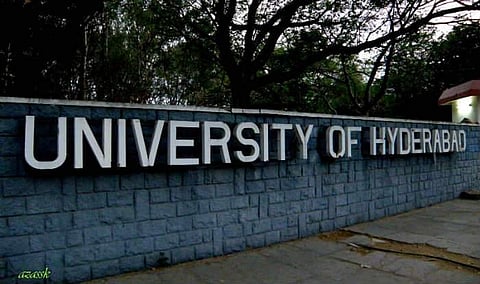

In the light of UGC granting autonomous status to the University of Hyderabad, the University of Hyderabad Teachers Association has alleged that the document "Leveraging Graded Autonomy to Achieve Global Excellence" that has been circulated and discussed at the recent heads and deans meeting will have far-reaching consequences for all faculty, especially assistant and associate professors of University.
It would also "alter the nature of public institutions, its constitutional requirements, its commitment to society, dilute academic standards and push public institutions towards gradual privatisation."
UHTA has also raised objections to the hurried manner in which the document was being introduced in the Academic Council Meeting held on Tuesday and specifically at administration's reluctance to share the documents pertaining to school/department/centre level decisions made on leveraging graded autonomy.
Stating that quality enhancement needs widespread, participatory discussions and intensive deliberations at department, school, and the University level involving all faculty, a statement released by the UHTA highlighted that "an Institution's autonomy cannot also be separated from the autonomy of its faculty, various departments and Schools. It should protect and nurture the interests (academic, professional and general well-being) of all its constituents. Autonomy and excellence cannot be driven by anxiety about disincentives but instead should emerge through continuous, constructive and collaborative engagement between teaching and research."
The teaching community is apprehensive that the qualitative evaluation of teaching would backfire and lead to malpractices regarding citations. "Instead of focusing on how to improve overall ecosystem in the university that leads to a gradual improvement in the quality, rushing to put in quantitative parameters of performance to achieve rankings is probably the best way to kill quality," said one professor. Incentivising performance would mean disparity in the pay scale of faculty and that would be against UGC norms.
Most departments are also skeptical of the proposal to start off campuses for different schools off-campus centres on grounds that the pedagogy of certain department requires close one-on-one collaboration and dialogue with the students and also that the schools do not have access to revenue sources that will allow them to run and maintain these off-campus centers.
Prof Vinod Pavarala, official spokesperson of the varsity said that the vice chancellor in the special Academic Council meeting on Tuesday clarified that while there will be incentives in the form of fast track promotions for high achievers, there will not be any disincentives for others. Their salary and promotion will be as per the UGC norms.
"Different School and departments can have their own norms for evaluating quality. Also, there is a proposal to set up student welfare and research grant for students to help them get scholarships. Additional revenue will not be by increasing tuition fee of regular courses but specials short term courses would be offered for this. And the revenue thus generated would go to the proposed students' grants," he said.
